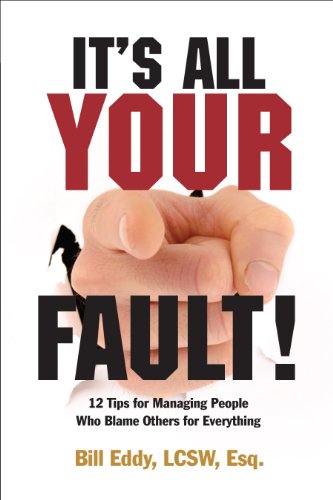 |  | It's All Your Fault! 12 Tips for Managing People Who Blame You For Everything
Author: Bill Eddy, LCSW, Esq.
Publisher: Janis Publications USA Inc. (April 25, 2008)
Paperback: 372 pages
ISBN-10: 0981509037
ISBN-13: 978-0981509037


|
Book DescriptionBill Eddy, a therapist turned attorney, is uniquely qualified to address how to handle conflicts with personality disordered individuals (or those acting like personality disordered individuals). He's written a very practical guide on the subject -
It's All YOUR Fault!Eddy refers throughout the book to HCPs - High Conflict People. These are people who constantly get into conflicts with others, because they blame others and avoid responsibility. They find Targets of Blame - i.e.
you - to wrongly blame for their problems. The process by which they do this is totally unconscious to them - they don't realize that they are thinking wrongly and sabotaging themselves by creating conflicts where none need exist. If that terminology seems unfamiliar, that's probably because it is

Eddy finds ways to put complex psychological concepts into simple, clear, everyday language. This is one strong reason that this is a very helpful book for understanding BPD - especially at a time of crisis when a lot of the psychological language in other resources can be a bit bewildering. The book is structured as 12 "tips" for dealing with HCPs. Each tip has its own chapter, which explains the concept and how to take action.
Part I: Understanding High Conflict PeopleTip #1: Don't Take Their Personal Attacks Personally
Tip #2: Don't Give Them Negative Feedback
Tip #3: Don't Bend Boundaries With Borderlines
Tip #4: Don't Diss the Narcissists
Tip #5: Don't Get Hooked by Histrionics
Tip #6: Don't Get Conned by Antisocials
Tip #7: Don't Be a Negative Advocate
Part II: Managing High Conflict PeopleTip #8: Connect Using Your E.A.R.
Tip #9: Analyze Your Realistic Options
Tip #10: Respond Quickly to Misinformation
Tip #11: Set Limits on Misbehavior
Tip #12: Choose Your Battles
Several examples are referenced throughout the book - "The Neighbor From Hell", "The Arrogant Coworker", and "The Blaming Brother". As you can see, the book is not primarily focused on intimate relationships, though it useful for understanding and dealing with them.
One very nice feature is Eddy's obvious empathy for HCPs. He regularly cautions us not to label people, not to try to diagnose them, and to examine
ourselves for signs of high conflict thinking. While he does not shy away from referring to personality disorders (and he addresses their varieties where relevant) his focus is on dealing with
behaviors, not labels.





 Poll
Poll
